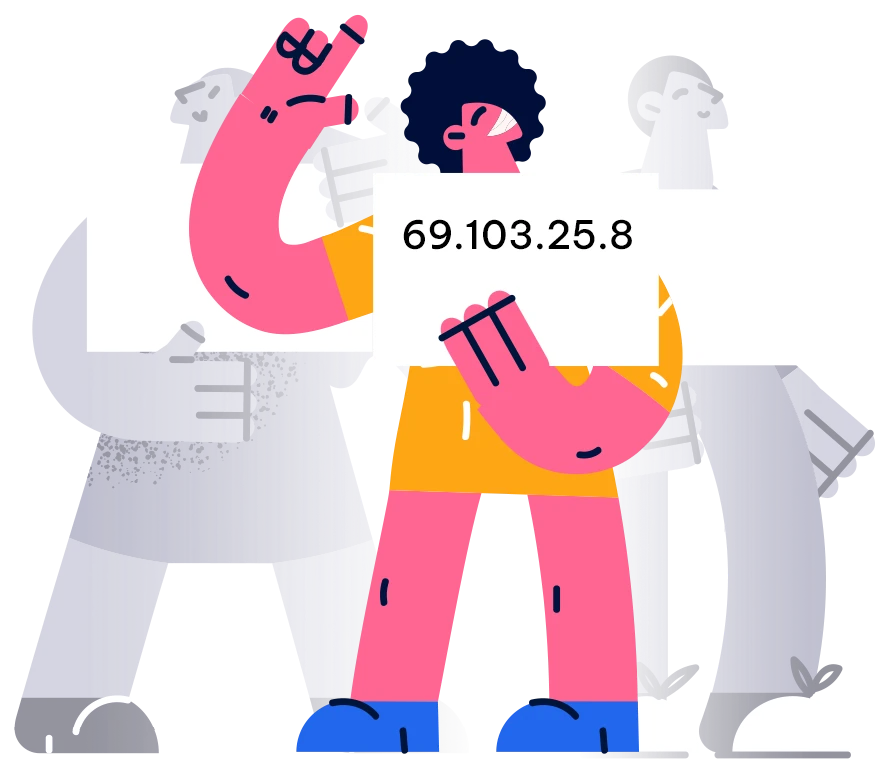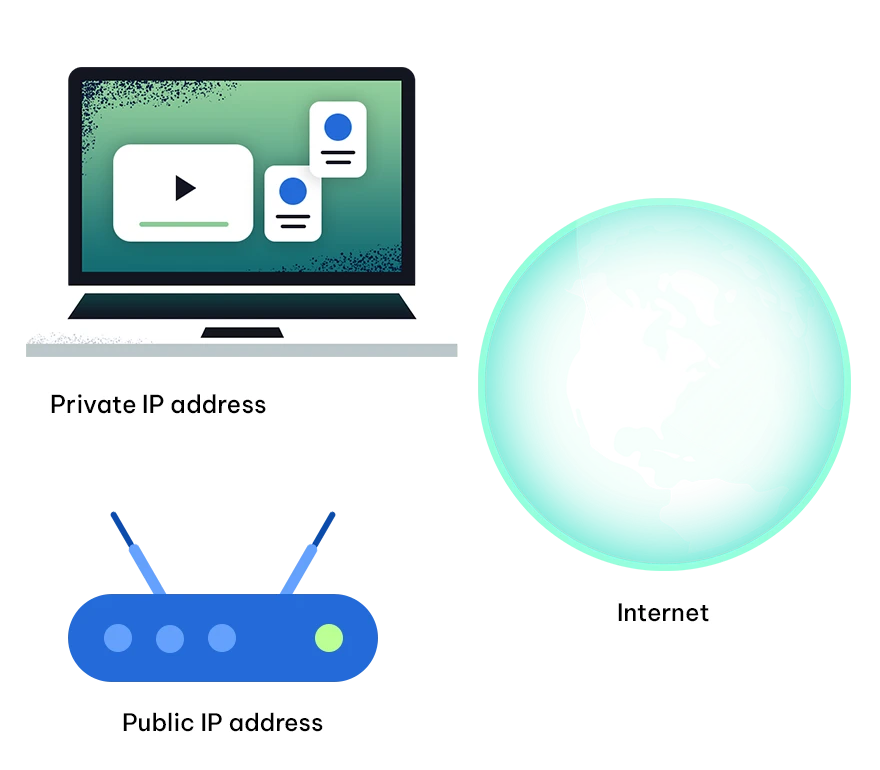Why Should You Hide Your Real Ip Address?
No matter what you do when going online, changing your IP address can help you evade hackers, snoops, and other forms of surveillance. Because you’re hiding who you are and where you’re located (essentially your online identity), you’ll have many privacy and security advantages.
Your IP address is just for you
Comprehensive protection
Hidden location
Privacy online

What Is an IP Address?
Cars have VINs. Humans have Social Security numbers. And our Internet-connected devices have unique identifiers, too — Internet Protocol addresses, commonly known as IP addresses. An IP address is a unique string of numbers assigned to an Internet-connected device. Your computer network uses the IP address to communicate with other computers, websites, and all parts of cyberspace.
IPv4 vs. IPv6 addresses
IP Version 4 (IPv4) and IP Version 6 (IPv6) are currently two versions of Internet Protocol in use. Their two main functions are identification and location addressing.
So what sets IPv4 apart from IPv6? It is the number of possible addresses. IPv4 is limited to around 4 billion addresses because it uses only 32 bits. As the Internet has been running out of IPv4 addresses, IPv6 was designed in 1995 to enable the continued global expansion of the Internet. IPv6 creates a much larger pool of IP addresses while also providing improvements to Internet addressing, configuration, maintenance, and security capabilities. IPv6 uses 128 bits, resulting in 3.4 x 1038 possible addresses.

Public Vs. Private IP Addresses
Public and private IP addresses are two crucial parts of your device’s identity that most people rarely think about. With a huge increase in employees working from home, and cybercrimes on the rise, it’s more important than ever to understand how your device’s IP address can reveal your identity on the Internet. So, what’s the difference between public and private IP addresses?
On a typical network, the router uses a public IP address to identify you, ensuring that emails, websites, streaming content, and other data reach you correctly.
On the other hand, the private IP address identifies different devices connected to the same local network (like printers). Within that network, there are likely a variety of different devices that aren't directly connected to the Internet. The router assigns each device a unique private IP address so it can send data to the device that’s actually requesting it. Devices on the same network use private IP addresses to communicate directly.
What Your IP Address Can Reveal About You and Your Location
Whenever you use the Internet to send an email, visit a website, or watch a movie on Netflix, you’re also sharing your IP address. When you type search terms into mainstream search engines, they collect data, including your IP address. The most personal kind of information that can be shared in the IP address itself is geolocation. But the good news is because you are connected to a network, it's the network's IP address being shared, not your precise location such as a home address. However, IP addresses might reveal your city, ZIP code, or area code of where you are connecting to the Internet at that moment — this is why IP addresses change every time you connect from a new location or use a new router.
Anytime you visit a website, it can potentially gather even more information about you. By combining your IP address with other information gleaned from metadata, cookies, trackers, and browser-fingerprinting tactics, website owners, marketers, and advertisers can build quite a thorough profile about you.
They can piece together your location, what websites you're visiting, what you're interested in, what you're downloading, and who you're talking to, and then present you with targeted content and advertisements—or sell your data to the highest bidder.
ISPs are privy to even more information. There is very little about you that your ISP doesn't know. Because you're a customer, it knows your name, address, phone number, credit card number, bank account details, credit history, and potentially even more. An ISP can also use your IP address to block, redirect, and censor your web activity.
Frequently Asked Questions (FAQ)
A virtual private network (VPN) masks your IP address and encrypts your internet traffic so your browsing activities are hidden from your ISP, network admin, or even government. A VPN gives you extra privacy and anonymity online, adding another layer of encryption to your Internet usage. And because a VPN changes your IP address, it also helps you access content that would otherwise be restricted because of your geographic location — thereby increasing digital privacy and online freedom.
Apart from complete anonymity, a virtual private network also provides users with:
• Streaming and unblocking content
• Protecting your identity and personal info
• Safely connecting to public Wi-Fi
• Anonymously commenting and publishing
• Preventing throttling and speeding up your internet access
• Defeating censorship and site blocking
• Money saving on travel
• Downloading and sharing files anonymously
• Logging in with multiple devices
• Stopping ISP tracking
YES.
VPNs are legal in most territories and frequently used by individuals and companies around the world to protect their private information and online activity; including those in countries with highly restrictive governments. Even in those states that discourage VPNs, most governments tacitly endorse their use by officials, academics, or business leaders as a necessary measure to stay competitive in an interconnected world. It is not practical for any country to ban all VPNs.
With or without a VPN, you should be aware that any illegal online activity remains illegal, whether it is caught or not.
After activating the VPN, you’ll be connected to your choice of SysVPN world-class server around the world. Your IP address then instantly changes to one from the server's location and your Internet traffic becomes encrypted. You can use SysVPN to simply get extra privacy or to unlock geo-restricted content.
SysVPN offers the best VPN service at a significantly lower price than our competitors. We also have a strict no-logs policy, which means no one can see your usage data. SysVPN also uses world-class, next-gen server infrastructure located all over the world — meaning you get a secure, reliable VPN connection anytime, anywhere. SysVPN’s virtual private network also works with all major streaming services to provide you with unrestricted access to all of your favorite content.
Plus, with only one SysVPN subscription, you can connect unlimited devices and use up to 6 devices simultaneously.
Yes, it will, in a good way. Unlike free VPNs that slow things down, SysVPN will boost your internet connection speed incredibly, bypassing ISP throttling or congested network issues.
When you connect to a VPN server, you shield your Internet traffic from your Internet service provider (ISP) and others. They can no longer see your online activities — but the one holding your shield can. That’s why it’s crucial to know what kind of logs your VPN provider keeps.
SysVPN never keeps logs of your online activities. We strictly abide by our 100% no-usage-logs policy – that means we don’t collect or store any VPN usage information about our users such as your browsing activity or connection or bandwidth usage or anything like that. The VPN server only keeps enough data to keep your VPN connection going, but nothing of it is stored after you’re done.
All apps consume some battery but SysVPN is among those that do it the least thanks to the new custom-built VPN protocol.
SysVPN allows you to protect up to 6 devices with just one account at the same time, ensuring every device you own is secure, even if you switch devices. SysVPN supports all platforms such as Android, iOS, Window, MacOS, Android TV, Router, Linux, etc.
In order to use SysVPN on your other devices, get our application for your devices of choice, and then sign in with your SysVPN account.
Even if you aren't utilizing SYSVPN right away, we nevertheless advise you to leave it on whenever your device is online. You may rest easy knowing that your privacy is always secured if you leave the program running in the background.
Using a VPN while utilizing public Wi-Fi networks is not only a reliable method of security but can also provide significant protection for your online banking activities.
Moreover, to avoid the risk of being denied access, it is advisable to connect to a server located within your home country before logging into your bank or PayPal account. This is because certain financial institutions restrict access for individuals appearing to connect from unfamiliar locations.
